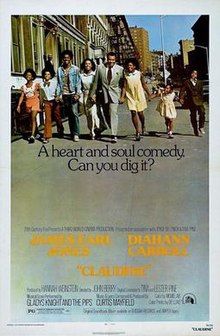Claudine (film)
| Claudine | |
|---|---|

Original theatrical poster for Claudine.
|
|
| Directed by | John Berry |
| Produced by | Hannah Weinstein |
| Written by | Lester Pine Tina Pine |
| Starring |
Diahann Carroll James Earl Jones Lawrence Hilton-Jacobs Tamu David Kruger Yvette Curtis Socorro Stephens Eric Jones Adam Wade Roxie Roker Elisa Loti |
| Music by | Curtis Mayfield |
| Cinematography | Gayne Rescher |
| Edited by | Louis San Andres |
|
Production
company |
|
| Distributed by | 20th Century Fox |
|
Release date
|
|
|
Running time
|
92 minutes |
| Country | United States |
| Language | English |
| Box office | $6 million |
Claudine is a 1974 American comedy-drama/romantic film, produced by Third World Films and distributed by 20th Century Fox. Starring James Earl Jones, Diahann Carroll, and Lawrence Hilton-Jacobs, it is noted for being one of the few mainstream films featuring an African-American cast released during that time which was not a blaxploitation film.
Claudine was written by Lester Pine and Tina Pine and directed by John Berry. The film was released on April 22, 1974, grossing about $6 million.
The film tells the story of Claudine Price (Diahann Carroll), a single Black Harlem mother, living on welfare with six children, who finds love with a garbage collector, Rupert Marshall (James Earl Jones), whom she calls "Roop". The pair's relationship becomes complicated because of a number of factors. Among these are that the couple do not want to marry because they would not be able to support the children without welfare, and that the kids themselves, particularly eldest son Charles (Lawrence Hilton-Jacobs), are apprehensive of Rupert, and believe that he will leave their mother just like her previous husbands had.
Claudine and Rupert meet while both of them are at work. Rupert asks Claudine out on a date with him and Claudine accepts. When Rupert becomes invited inside Claudine's apartment, the children are rude and vulgar towards Rupert. This is also the first time the audience meets the children and sees the inside of Claudine's slum-like apartment. Later on in the film, the audience finds out that Claudine receives financial aid from the government through the welfare program. Throughout the film, Miss Kabak, the social worker, visits Claudine at her home and asks her if she is employed and if she is dating anyone. Claudine always denies Miss Kabak the truth and lies to her about being unemployed and single. If Claudine tells the truth and says that she is employed, the amount of financial aid she receives from the welfare program would decrease or she could also no longer receive any more financial aid. If Claudine dates anyone and receives gifts from her boyfriend, the social worker has to deduct any money or gifts Claudine is receiving from whomever she is dating.
...
Wikipedia
